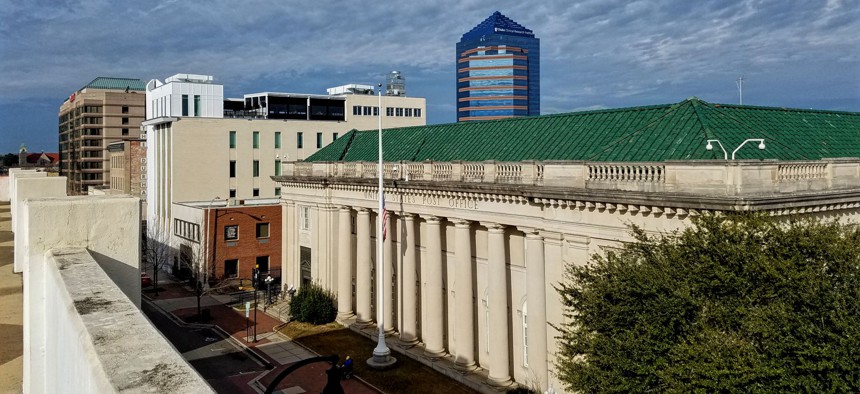Route Fifty Roadmap: Amid Google Fiber’s Pivot, Its Expansion Continues in N.C.

Looking out on Chapel Hill Street in Durham, North Carolina Michael Grass / RouteFifty.com
As Alphabet Inc. rethinks its grand gigabit vision and puts some cities on hold, installation presses forward in North Carolina’s Research Triangle.
Route Fifty Roadmap is an ongoing series of dispatches from the semi-regular travels of the Route Fifty staff across the United States. | PREVIOUSLY: Raleigh, N.C.
DURHAM, N.C. — While exploring Bull City’s revitalizing downtown commercial core recently, I stumbled across a local office for Google Fiber in a renovated brick building on E. Chapel Hill Street, a short walk from where the 27-story One City Center tower is currently under construction.
In a storefront window, there’s a promotional hashtag for Google’s gigabit-speed broadband expansion on full display for all to see: #FiberIsComing.

Indeed, Google Fiber’s installation in underway in North Carolina’s Research Triangle, which includes Durham. But in other places that had been previously scoped out for Google’s gigabit expansion in U.S. cities, that’s not the case anymore. Fiber isn’t coming, at least not for awhile.
Google’s parent, Alphabet Inc., is seeking alternative ways to deliver its sought-after gigabit-speed internet that doesn’t involve intensive—and costly—fiber installation work.
In October, Craig Barratt, an Alphabet senior vice president and CEO of Access, the division that operates Google Fiber, announced in a company blog post that when it comes to “potential” Fiber cities, “we’re going to pause our operations and offices while we refine our approaches.”
Deploying new wireless technology, instead of laying cable, promises to be a less-costly route to build out gigabit-speed networks.
In the meantime, Google Fiber’s expansion has stalled in places like Dallas, Phoenix and Portland, Oregon, or alternative models are being pursued, like in Huntsville, Alabama, and San Francisco—models that don’t involve Google building its own network from scratch.
But plans were far enough in the Research Triangle to continue installing new fiber connections.
"We can’t wait to offer superfast internet to more residents in the Triangle,” according to a Google company statement in October, The News & Observer reported.
In all, a 5,000-mile fiber network has been planned in and around Raleigh and Durham, which were originally included in Google Fiber’s planned expansion in the Southeastern U.S. That group of cities, announced in January 2015, included Atlanta, Charlotte and Nashville, where work to deliver gigabit-speed internet continues.
Although Google Fiber has not publicly disclosed many details regarding its installation work in Durham, it hasn’t been without its hiccups, local media has reported.
According to The Triangle Business Journal, which recently sought more information from the city on the installation work through a public records request:
Through public records acquired by Triangle Business Journal, it's clear that construction is well underway in Bull City, where it's already received 305 permits.But it has also received 16 notices of violation, 16 notices of penalty for water quality issues and a total of six stop work orders, according to public records. As of mid-November, five of the 16 civil penalties levied by Durham for storm water matters had not been paid.
As that experience demonstrates, installing new cable infrastructure in cities isn’t a simple or clean process. Local regulatory process can be tough to navigate, too. Google’s shift in strategy seems to fully recognize those realities.
In a Route Fifty Roadmap feature I wrote this fall, some of the early signs of trouble for Google Fiber surfaced in places like Leawood, Kansas, a leafy and wealthy suburban community where municipal rules on the siting of utility infrastructure—the majority of which are undergrounded—created too many regulatory obstacles to make the company’s gigabit expansion feasible. Google Fiber pulled out of Leawood in 2014 amid expansion elsewhere in the Kansas City area.
But the story is different in North Carolina.
As this recent tweet from the Research Triangle attests, #FiberIsComing indeed.
Michael Grass is Executive Editor of Government Executive’s Route Fifty and is based in Seattle.

NEXT STORY: Mobile apps added to NIST software database






